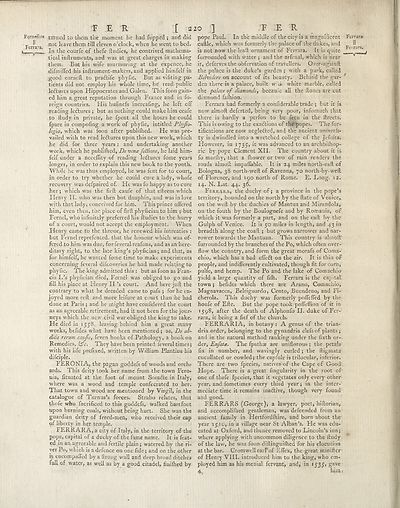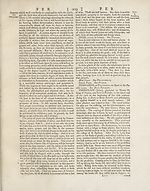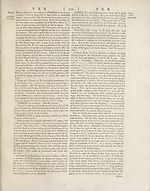Encyclopaedia Britannica > Volume 7, ETM-GOA
(242) Page 220
Download files
Complete book:
Individual page:
Thumbnail gallery: Grid view | List view

F E R [ a.
FemeJius turned to them the moment he had flipped; and did
Ferra-a nui" ^eave them till eleven o’clock, when he went to bed.
Lj- — . In the courfe of thefe {Indies, he contrived mathema¬
tical inftmments, and was at great charges in making
them. But his wife murmuring at the expence, he
difrnifled his inllrument-makers, and applied himfelf in
good earneft to praftife phyfic. But as viliting pa¬
tients did not employ his whole time, he’ read public
le&ures upon Hippocrates and Galen. This foon gain¬
ed him a great reputation through France and in fo¬
reign countries. His bufinefs increafng, he left off
reading le&ures ; but as nothing could make him ceafe
to lludy in private, he fpent all the hours he could
fpare in compofing a work of phyfic, intitled Ph^fio-
logia, which was foon after publifhed. He was pre¬
vailed with to read le&ures upon this new work, which
he did for three years: and undertaking another
work, which he publifhed. De vena feftione, he laid him¬
felf under a neceflity of reading le&ures fame years
longer, in order to explain this new book to the youth.
While he was thus employed, he was fent for to court,
in order to try whether he could cure a lady, whofe
recovery was defpaired of. He was fo happy as to cure
her; which was the firft caufe of that efteem which
Henty II. who was then but dauphin, and was in love
with that lady, conceived for him. This prince offered
him, even then, the place of firit phyficianto him ; but
Fernei, who infinitely preferred his ftudies to the hurry
of a court, would not accept the employment. When
Henry came to the throne, he renewed his intreaties :
but Fcrnel reprefented, that the honour which was of¬
fered to him was due, forfeveralreafons, and as aft here¬
ditary right, to the late king’s phyficianand that, as
for himfelf, he wanted fome time to make experiments
concerning feveral difeoveries he had made relating to
phyfic. The king admitted this : but as foon as Fran¬
cis I.’s phyfician died, Fernei was obliged to go and
fill his place at Henry II’s court. And here juft the
contrary to what he dreaded came to pafs ; for he en¬
joyed more reft and more leifure at court than he had
done at Paris ; and he might have confidered the court
as an agreeable retirement, had it not been for the jour¬
neys which the new civil war obliged the king to take.
He died in 1558, leaving behind him a great many
works, befides what have been mentioned ; as, De ab-
ditis rerum caujis, feven books of Pathology^, a book on
Remedies, £5r. They have been printed feveral times;
wuth his life prefixed, written by William Plantius his
difciple.
FERONIA, the pagan goddefs of woods and orch¬
ards. This deity took her name from the town Fero-
pia, fituated at the foot of mount Soradte in Italy,
where was a wood and temple confecrated to her.
That town and wood are mentioned by Virgil, in the
catalogue of Turnus’s forces. Strabo relates, that
thofe who facrificed to this goddefs, walked barefoot
upon burning coals, without being hurt. She was the
guardian deity of freed-men, who received their cap
of liberty in her temple.
FERRARA, a city of Italy, in the territory of the
pope, capital of a duchy of the fame name. It is feat-
ed in an agreeable and fertile plain; watered by the ri¬
ver Po, which is a defence on one fide; and on the other
is encompafted by a itrong wall and deep broad ditches
full of water, as well as by a good citadel, finifhed by
,0 ] F E R
pope Paul. In the middle of the city is a magnificent Ferrara
caftle, which was formerly the palace of the dukes, and Fe Jars
is not now the leaf! ornament of Ferrara. It is quite "*
furrounded with water ; and the arfenal, which is near
it, deferves the obfervation of travellers. Over-againft
the palace is the duke’s garden ; with a park, called
Belvidere on account of its beauty. Behind the gar- 1
den there is a palace, built w’d1 white marble, called
the palace of diamonds, becauie all the Hones are cut
diamond fafhion.
Ferrara had formerly a confiderable trade ; but it is
now almoft deferted, being very poor, infomuch that
there is hardly a perfon to be feen in the ftreets.
This is owing to the exaftions of the'popes. The for¬
tifications are now negledled, and the ancient univerfi-
ty is dwindled into a wretched college of the Jefuits.
However, in 1735, it was advanced to an archbiihop-
ric by pope Clement XII. The country about it is
fo marfhy, that a fiiower or two of rain renders the
roads almoft impaffable. It is 24 miles north-eaft of
Bologna, 38 north-weft of Ravenna, 70 north-by-weft
of Florence, and 190 north of Rome. E. Long. 12.
14. N. Lat. 44. 36.
Ferrara, the duchy of; a province in the pope’s
territory, bounded on the north by the ftafe of Venice,:
on the weft by the duchies of Mantua and Mirandola,
on the fouth by the Boulognefe and by Romania, of
which it was formerly a part, and on the eaft by the-
Gulph of Venice. It is 50 miles in length, and 43 in¬
breadth along the coaft ; but grows narrower and nar¬
rower towards the Mantuan. This country is almolt
furrounded by the branches of the Po, which often over¬
flow the country, and form the great morafs of Coma-
chio, which has a bad effedt on the air. It is thin of
people, and indifferently cultivated, though fit for corn,
pulfe, and hemp. The Po and the lake of Comachio-
yield a large quantity of fifh. Ferrara is the capital;
town; befides which there are Arano, Comachio,
Magnavacca, Belriguardo, Cento, Buendeno, and Fi-
cherola. This duchy was formerly poffeffed by the
houfe of Efte. But the pope took poffeflion of it in
1598, after the death of Alphonfo II. duke of Fer¬
rara, it being a fief of the church.
FERRARIA, in botany : A genus of the trian-
dria order, belonging to the-gynandria clefs of plants;
and in the natural method ranking under the fixth or¬
der, .E/i/ate. The fpathse are uniflorous ; the petals
fix in number, and wavingly curled ; the ftigmata
cucullated or cowled; the capfule is trilocular, inferior.
There are two fpecies, natives of the Cape of Good-
Hope. There is a great Angularity in the root of'
one of thefe fpecies, that it vegetates only every other
year, and fometimes every third year; in the inter¬
mediate time it remains inadtive, though very found:
and good.
FERRARS (George); a lawyer, poet, hiftorian,
and accomplifhed gentleman, was defeended from an;
ancient family in Hertfordftiire, and born about the
year 15.10, in a village near St Alban’s, tie was edu¬
cated at Oxford, and thence removed to Lincoln’s inn;
where applying with uncommon diligence to the ftudy
of the law, he was foon diftinguifhed for his elocution
at the bar. Cromwell eaiTof Effex, the great minifter
of Henry VIII. introduced him to the king, who em¬
ployed him as his menial fervant, and,, in 1535, gave
4-, him ■,
FemeJius turned to them the moment he had flipped; and did
Ferra-a nui" ^eave them till eleven o’clock, when he went to bed.
Lj- — . In the courfe of thefe {Indies, he contrived mathema¬
tical inftmments, and was at great charges in making
them. But his wife murmuring at the expence, he
difrnifled his inllrument-makers, and applied himfelf in
good earneft to praftife phyfic. But as viliting pa¬
tients did not employ his whole time, he’ read public
le&ures upon Hippocrates and Galen. This foon gain¬
ed him a great reputation through France and in fo¬
reign countries. His bufinefs increafng, he left off
reading le&ures ; but as nothing could make him ceafe
to lludy in private, he fpent all the hours he could
fpare in compofing a work of phyfic, intitled Ph^fio-
logia, which was foon after publifhed. He was pre¬
vailed with to read le&ures upon this new work, which
he did for three years: and undertaking another
work, which he publifhed. De vena feftione, he laid him¬
felf under a neceflity of reading le&ures fame years
longer, in order to explain this new book to the youth.
While he was thus employed, he was fent for to court,
in order to try whether he could cure a lady, whofe
recovery was defpaired of. He was fo happy as to cure
her; which was the firft caufe of that efteem which
Henty II. who was then but dauphin, and was in love
with that lady, conceived for him. This prince offered
him, even then, the place of firit phyficianto him ; but
Fernei, who infinitely preferred his ftudies to the hurry
of a court, would not accept the employment. When
Henry came to the throne, he renewed his intreaties :
but Fcrnel reprefented, that the honour which was of¬
fered to him was due, forfeveralreafons, and as aft here¬
ditary right, to the late king’s phyficianand that, as
for himfelf, he wanted fome time to make experiments
concerning feveral difeoveries he had made relating to
phyfic. The king admitted this : but as foon as Fran¬
cis I.’s phyfician died, Fernei was obliged to go and
fill his place at Henry II’s court. And here juft the
contrary to what he dreaded came to pafs ; for he en¬
joyed more reft and more leifure at court than he had
done at Paris ; and he might have confidered the court
as an agreeable retirement, had it not been for the jour¬
neys which the new civil war obliged the king to take.
He died in 1558, leaving behind him a great many
works, befides what have been mentioned ; as, De ab-
ditis rerum caujis, feven books of Pathology^, a book on
Remedies, £5r. They have been printed feveral times;
wuth his life prefixed, written by William Plantius his
difciple.
FERONIA, the pagan goddefs of woods and orch¬
ards. This deity took her name from the town Fero-
pia, fituated at the foot of mount Soradte in Italy,
where was a wood and temple confecrated to her.
That town and wood are mentioned by Virgil, in the
catalogue of Turnus’s forces. Strabo relates, that
thofe who facrificed to this goddefs, walked barefoot
upon burning coals, without being hurt. She was the
guardian deity of freed-men, who received their cap
of liberty in her temple.
FERRARA, a city of Italy, in the territory of the
pope, capital of a duchy of the fame name. It is feat-
ed in an agreeable and fertile plain; watered by the ri¬
ver Po, which is a defence on one fide; and on the other
is encompafted by a itrong wall and deep broad ditches
full of water, as well as by a good citadel, finifhed by
,0 ] F E R
pope Paul. In the middle of the city is a magnificent Ferrara
caftle, which was formerly the palace of the dukes, and Fe Jars
is not now the leaf! ornament of Ferrara. It is quite "*
furrounded with water ; and the arfenal, which is near
it, deferves the obfervation of travellers. Over-againft
the palace is the duke’s garden ; with a park, called
Belvidere on account of its beauty. Behind the gar- 1
den there is a palace, built w’d1 white marble, called
the palace of diamonds, becauie all the Hones are cut
diamond fafhion.
Ferrara had formerly a confiderable trade ; but it is
now almoft deferted, being very poor, infomuch that
there is hardly a perfon to be feen in the ftreets.
This is owing to the exaftions of the'popes. The for¬
tifications are now negledled, and the ancient univerfi-
ty is dwindled into a wretched college of the Jefuits.
However, in 1735, it was advanced to an archbiihop-
ric by pope Clement XII. The country about it is
fo marfhy, that a fiiower or two of rain renders the
roads almoft impaffable. It is 24 miles north-eaft of
Bologna, 38 north-weft of Ravenna, 70 north-by-weft
of Florence, and 190 north of Rome. E. Long. 12.
14. N. Lat. 44. 36.
Ferrara, the duchy of; a province in the pope’s
territory, bounded on the north by the ftafe of Venice,:
on the weft by the duchies of Mantua and Mirandola,
on the fouth by the Boulognefe and by Romania, of
which it was formerly a part, and on the eaft by the-
Gulph of Venice. It is 50 miles in length, and 43 in¬
breadth along the coaft ; but grows narrower and nar¬
rower towards the Mantuan. This country is almolt
furrounded by the branches of the Po, which often over¬
flow the country, and form the great morafs of Coma-
chio, which has a bad effedt on the air. It is thin of
people, and indifferently cultivated, though fit for corn,
pulfe, and hemp. The Po and the lake of Comachio-
yield a large quantity of fifh. Ferrara is the capital;
town; befides which there are Arano, Comachio,
Magnavacca, Belriguardo, Cento, Buendeno, and Fi-
cherola. This duchy was formerly poffeffed by the
houfe of Efte. But the pope took poffeflion of it in
1598, after the death of Alphonfo II. duke of Fer¬
rara, it being a fief of the church.
FERRARIA, in botany : A genus of the trian-
dria order, belonging to the-gynandria clefs of plants;
and in the natural method ranking under the fixth or¬
der, .E/i/ate. The fpathse are uniflorous ; the petals
fix in number, and wavingly curled ; the ftigmata
cucullated or cowled; the capfule is trilocular, inferior.
There are two fpecies, natives of the Cape of Good-
Hope. There is a great Angularity in the root of'
one of thefe fpecies, that it vegetates only every other
year, and fometimes every third year; in the inter¬
mediate time it remains inadtive, though very found:
and good.
FERRARS (George); a lawyer, poet, hiftorian,
and accomplifhed gentleman, was defeended from an;
ancient family in Hertfordftiire, and born about the
year 15.10, in a village near St Alban’s, tie was edu¬
cated at Oxford, and thence removed to Lincoln’s inn;
where applying with uncommon diligence to the ftudy
of the law, he was foon diftinguifhed for his elocution
at the bar. Cromwell eaiTof Effex, the great minifter
of Henry VIII. introduced him to the king, who em¬
ployed him as his menial fervant, and,, in 1535, gave
4-, him ■,
Set display mode to:
![]() Universal Viewer |
Universal Viewer | ![]() Mirador |
Large image | Transcription
Mirador |
Large image | Transcription
Images and transcriptions on this page, including medium image downloads, may be used under the Creative Commons Attribution 4.0 International Licence unless otherwise stated. ![]()
| Encyclopaedia Britannica > Encyclopaedia Britannica > Volume 7, ETM-GOA > (242) Page 220 |
|---|
| Permanent URL | https://digital.nls.uk/189124375 |
|---|
| Attribution and copyright: |
|
|---|
| Description | Ten editions of 'Encyclopaedia Britannica', issued from 1768-1903, in 231 volumes. Originally issued in 100 weekly parts (3 volumes) between 1768 and 1771 by publishers: Colin Macfarquhar and Andrew Bell (Edinburgh); editor: William Smellie: engraver: Andrew Bell. Expanded editions in the 19th century featured more volumes and contributions from leading experts in their fields. Managed and published in Edinburgh up to the 9th edition (25 volumes, from 1875-1889); the 10th edition (1902-1903) re-issued the 9th edition, with 11 supplementary volumes. |
|---|---|
| Additional NLS resources: |
|

